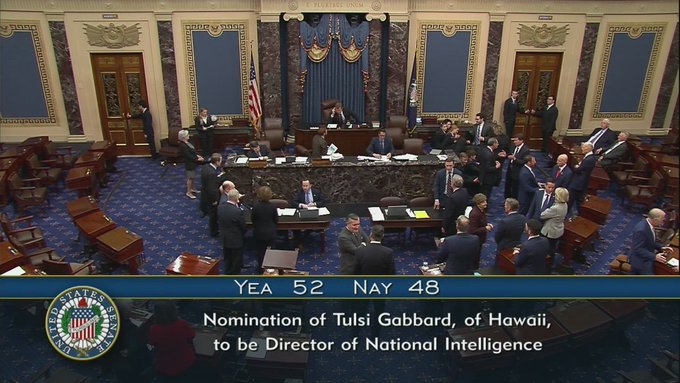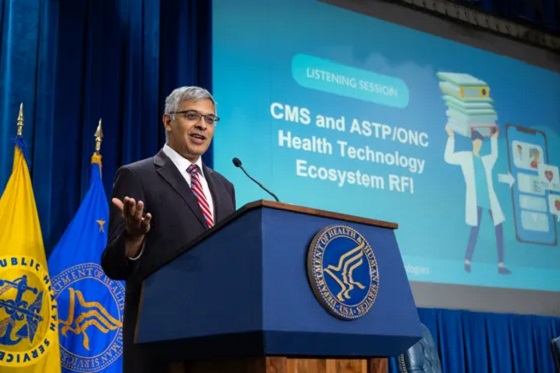espionage
Tulsi Gabbard confirmed as Trump’s Director of National Intelligence

Quick Hit:
The Senate on Wednesday confirmed former Democrat congresswoman Tulsi Gabbard as President Donald Trump’s director of national intelligence. The vote, which passed mostly along party lines at 52-48, followed weeks of intense debate over Gabbard’s past views on intelligence operations and foreign policy.


Key Details:
-
Gabbard, who represented Hawaii in Congress for eight years, faced sharp scrutiny from both parties over her past comments on U.S. adversaries, surveillance programs, and her stance on Edward Snowden.
-
Senate Intelligence Committee Republicans approved her nomination last week after she provided follow-up answers addressing their concerns. Some GOP lawmakers had initially resisted, citing worries over her foreign policy positions.
-
Senate Minority Leader Chuck Schumer opposed the confirmation, claiming that Gabbard “wouldn’t receive more than ten votes” if Republicans were allowed to vote in secret.
Diving Deeper:
Tulsi Gabbard, a former Democrat congresswoman from Hawaii turned Trump ally, was confirmed Wednesday as the director of national intelligence following a 52-48 Senate vote that split mostly along party lines. Former GOP Senate Leader Mitch McConnell was the only Republican to join all Democrats in voting against Gabbard, and the confirmation marks one of President Trump’s most controversial intelligence appointments, with Gabbard facing intense questioning over her positions on classified intelligence and foreign adversaries.
Gabbard’s past remarks and actions drew bipartisan concern, particularly her defense of Edward Snowden, her prior skepticism of U.S. intelligence assessments on Syria’s Bashar al-Assad, and her opposition to surveillance authorities like Section 702. Senate Intelligence Committee Republicans had initially hesitated on her nomination, but they ultimately backed her after she responded to follow-up inquiries about her positions on national security.
Virginia Sen. Mark Warner, the ranking Democrat on the Intelligence Committee, claimed that Gabbard was unfit for the role, accusing her of “publicly defending Snowden after he compromised our nation’s most sensitive collection sources and methods.” Warner also criticized her past statements blaming the U.S. and NATO for Russia’s invasion of Ukraine and her meeting with a controversial Syrian cleric.
During confirmation hearings, Gabbard refuted accusations that she harbored sympathies for foreign adversaries, calling the allegations “offensive.” She defended her record on national security and insisted that while she disagreed with Snowden’s actions, her proposed intelligence reforms would prevent similar leaks in the future.
Senate Republicans ultimately rallied behind Gabbard, with Senate Republican Whip John Barrasso pushing back on accusations that she had echoed Kremlin propaganda. He pointed to her past support for sanctions against Russia and Iran, as well as her backing of military aid to Ukraine after Russia’s 2014 annexation of Crimea.
Schumer and other Senate Democrats urged Republicans to resist pressure from the Trump administration, claiming that GOP lawmakers were putting politics ahead of national security. Despite these objections, the confirmation moved forward, concluding a bitterly divided debate over Gabbard’s appointment to lead the nation’s intelligence operations.
Energy
China undermining American energy independence, report says

From The Center Square
By
The Chinese Communist Party is exploiting the left’s green energy movement to hurt American energy independence, according to a new report from State Armor.
Michael Lucci, founder and CEO of State Armor, says the report shows how Energy Foundation China funds green energy initiatives that make America more reliant on China, especially on technology with known vulnerabilities.
“Our report exposes how Energy Foundation China functions not as an independent nonprofit, but as a vehicle advancing the strategic interests of the Chinese Communist Party by funding U.S. green energy initiatives to shift American supply chains toward Beijing and undermine our energy security,” Lucci said in a statement before the Senate Judiciary Subcommittee’s hearing on Wednesday titled “Enter the Dragon – China and the Left’s Lawfare Against American Energy Dominance.”
Lucci said the group’s operations represent a textbook example of Chinese influence in America.
“This is a very good example of how the Chinese Communist Party operates influence operations within the United States. I would actually describe it as a perfect case study from their perspective,” he told The Center Square in a phone interview. “They’re using American money to leverage American policy changes that make the American energy grid dependent upon China.”
Lucci said one of the most concerning findings is that China-backed technology entering the U.S. power grid includes components with “undisclosed back doors” – posing a direct threat to the power grid.
“These are not actually green tech technologies. They’re red technologies,” he said. “We are finding – and this is open-source news reporting – they have undisclosed back doors in them. They’re described in a Reuters article as rogue communication devices… another way to describe that is kill switches.”
Lucci said China exploits American political divisions on energy policy to insert these technologies under the guise of environmental progress.
“Yes, and it’s very crafty,” he said. “We are not addressing the fact that these green technologies are red. Technologies controlled by the Communist Party of China should be out of the question.”
Although Lucci sees a future for carbon-free energy sources in the United States – particularly nuclear and solar energy – he doesn’t think the country should use technology from a foreign adversary to do it.
“It cannot be Chinese solar inverters that are reported in Reuters six weeks ago as having undisclosed back doors,” he said. “It cannot be Chinese batteries going into the grid … that allow them to sabotage our grid.”
Lucci said energy is a national security issue, and the United States is in a far better position to achieve energy independence than China.
“We are luckily endowed with energy independence if we choose to have it. China is not endowed with that luxury,” he said. “They’re poor in natural resources. We’re very well endowed – one of the best – with natural resources for energy production.”
He said that’s why China continues to build coal plants – and some of that coal comes from Australia – while pushing the United States to use solar energy.
“It’s very foolish of us to just make ourselves dependent on their technologies that we don’t need, and which are coming with embedded back doors that give them actual control over our energy grid,” he said.
Lucci says lawmakers at both the state and federal levels need to respond to this threat quickly.
“The executive branch should look at whether Energy Foundation China is operating as an unregistered foreign agent,” he said. “State attorneys general should be looking at these back doors that are going into our power grid – undisclosed back doors. That’s consumer fraud. That’s a deceptive trade practice.”
espionage
Trump admin cracks down on China’s silent invasion of U.S. science

Quick Hit:
The Trump administration has launched a sweeping national security investigation into foreign scientists working in U.S. research institutions, targeting those from adversarial countries like China amid fears of espionage and biological threats.
Key Details:
- The probe targets as many as 1,000 foreign scientists inside the NIH alone, focusing heavily on Chinese nationals.
- Intelligence agencies are involved following multiple arrests of Chinese researchers attempting to smuggle dangerous pathogens into the U.S.
- The effort comes after repeated GAO warnings and revelations from a Chinese defector who says Beijing embeds agents in American labs.
Diving Deeper:
The Trump Administration has launched an intensive, behind-the-scenes investigation into hundreds of foreign scientists working in American research institutions—many of them tied to China’s communist regime. According to officials, the review began weeks ago and involves coordination with intelligence and security agencies.
The sweeping audit—prompted by longstanding concerns of foreign influence, espionage, and theft of intellectual property—has zeroed in on nearly 1,000 researchers within the National Institutes of Health (NIH) alone. Most are believed to have gained entry to the U.S. with help from federal research agencies during prior administrations, often without proper vetting.
“The Trump administration is committed to safeguarding America’s national and economic security,” White House spokesman Kush Desai told Just the News. “Taxpayer dollars should not and cannot fund foreign espionage against America’s industrial base and research apparatus.”
That warning is no longer hypothetical. In just the last month, federal officials say three Chinese scientists were arrested attempting to smuggle deadly pathogens into the U.S., including toxic fungi and crop-destroying roundworms—raising fresh fears of agroterrorism.
According to Dr. Li-Meng Yan, a Chinese virologist who defected to the U.S. in 2020, many scientists entering the U.S. from China are effectively agents of the Chinese Communist Party. “They have signed the contract with Chinese government to go back to China, serve for China with whatever they can get from the U.S.,” Yan said. “They become the CCPs’ kind of agents… like the parasites that go into your body.”
Years of inaction from federal agencies are partly to blame. The Government Accountability Office (GAO) has issued more than a half-dozen scathing reports warning that the NIH and partnering universities lack the safeguards to prevent foreign theft of research and influence over scientific projects funded by U.S. taxpayers.
In one 2021 report, GAO bluntly stated that “U.S. research may be subject to undue foreign influence” and cited the NIH’s failure to enforce conflict-of-interest policies, particularly with scientists tied to China.
The crackdown now underway comes amid a surge of related criminal activity. In one case, Chinese scientist Hao Zhang was convicted in 2020 for a scheme dating back to 2006 to steal proprietary semiconductor technology and launch a competing business in China. In another, a cybersecurity professor at Indiana University, Xiaofeng Wang, had his home raided by the FBI earlier this year and was quietly fired, though he has not been charged with any crime.
As part of the broader clampdown, the NIH recently issued new guidance barring researchers from funneling U.S. tax dollars to foreign partners through sub-grants. And the FDA has now halted all trials that export Americans’ cells to labs in hostile nations for genetic engineering—an issue of growing concern.
Congressional allies are backing the administration’s effort, with Rep. Nathaniel Moran (R-Texas) calling for sweeping reforms. “We’ve got to strengthen our own systems from within,” Moran said, “and we’ve got to push back in the trade world, in the tariff world and in the business practices world against China.”
With growing evidence of coordinated foreign espionage and exploitation of U.S. research systems, the administration’s covert operation marks a critical step in defending national security—and could reshape how America handles scientific collaboration for years to come.
-

 Crime2 days ago
Crime2 days agoNational Health Care Fraud Takedown Results in 324 Defendants Charged in Connection with Over $14.6 Billion in Alleged Fraud
-

 Health2 days ago
Health2 days agoRFK Jr. Unloads Disturbing Vaccine Secrets on Tucker—And Surprises Everyone on Trump
-

 Business1 day ago
Business1 day agoElon Musk slams Trump’s ‘Big Beautiful Bill,’ calls for new political party
-

 Business14 hours ago
Business14 hours agoWhy it’s time to repeal the oil tanker ban on B.C.’s north coast
-

 Censorship Industrial Complex1 day ago
Censorship Industrial Complex1 day agoGlobal media alliance colluded with foreign nations to crush free speech in America: House report
-

 International22 hours ago
International22 hours agoCBS settles with Trump over doctored 60 Minutes Harris interview
-

 Business15 hours ago
Business15 hours agoLatest shakedown attempt by Canada Post underscores need for privatization
-

 Energy14 hours ago
Energy14 hours agoIf Canada Wants to be the World’s Energy Partner, We Need to Act Like It






